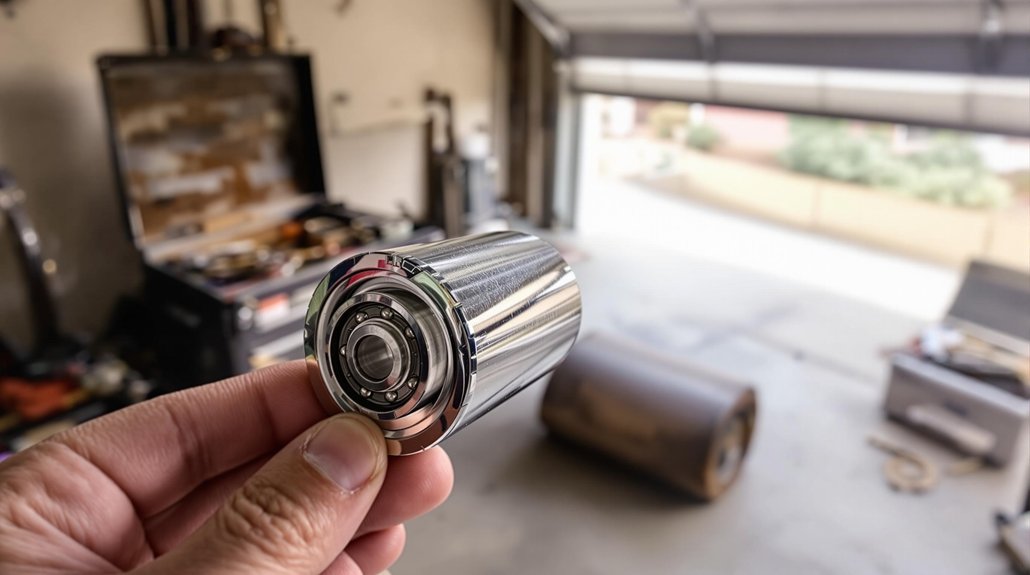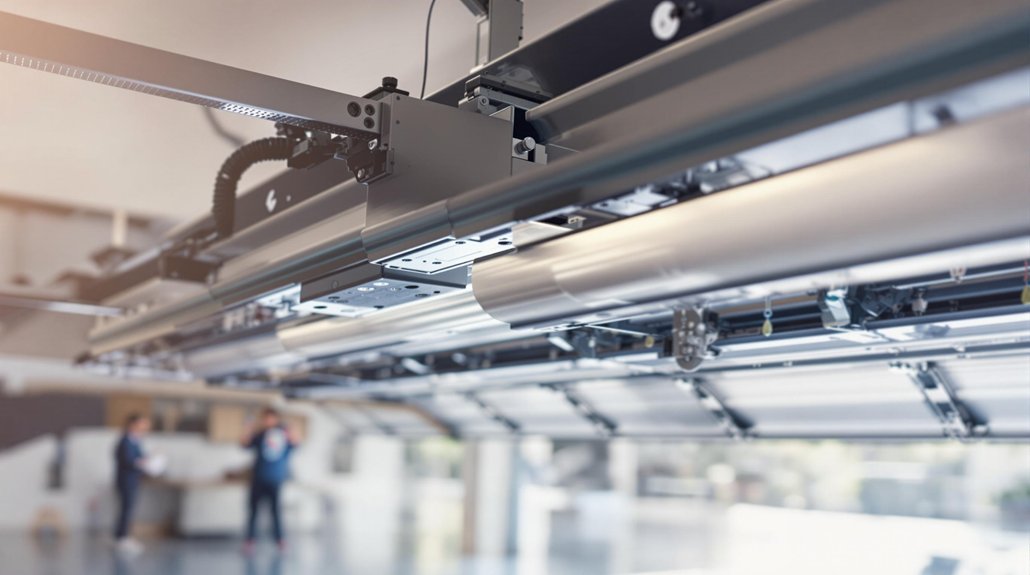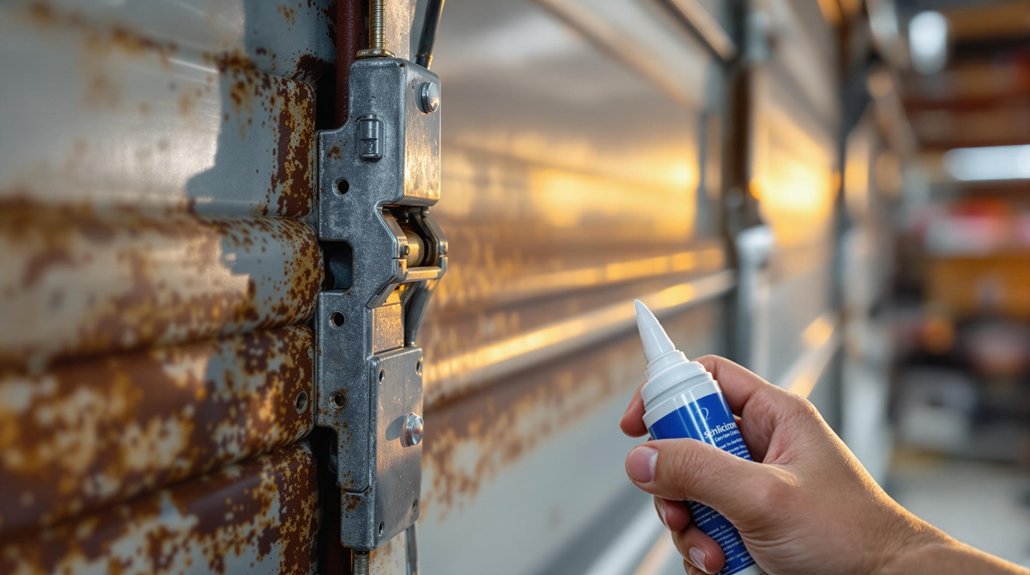To make a garage door quieter, start with regular maintenance. Inspect and lubricate moving parts, like tracks and rollers, using a silicone-based lubricant. Tighten any loose hardware, including bolts and screws, to prevent rattling sounds. Consider replacing old rollers, as they can create noise; choose the correct type based on your door. Installing soundproofing materials, such as acoustic panels and weather stripping, can further reduce noise. Finally, upgrading to a modern garage door opener with a belt drive can greatly decrease sound levels. To explore additional strategies, you might find more helpful tips and techniques.
Key Article Highlights
- Inspect and lubricate moving parts, including tracks, rollers, and springs, to ensure smooth and quiet operation.
- Tighten all loose hardware, such as bolts and screws, to eliminate rattling and improve performance.
- Replace old rollers with appropriate types to reduce noise, following proper installation procedures.
- Install soundproofing materials like acoustic panels and weather stripping to minimize sound transmission.
- Upgrade to a modern garage door opener with a quieter belt drive for enhanced operation and reduced noise.
Inspect and Lubricate Moving Parts
Maintaining the functionality of your garage door is essential for a quiet operation. One of the most important steps is to regularly inspect and lubricate the moving parts. Start by focusing on the hinges, which play a significant role in allowing the door to open and close smoothly. Inspect hinges for any signs of wear or damage. If you notice any issues, consider replacing them to guarantee peak performance.
Next, clean the tracks where the garage door operates. Dust, dirt, or debris can accumulate in these areas, causing the door to function poorly and generate noise. Use a damp cloth or a soft brush to remove any buildup. Once the tracks are clean, it is critical to lubricate them. Apply a silicone-based lubricant to the tracks to guarantee seamless movement of the door.
In addition to hinges and tracks, consider lubricating other moving parts such as rollers and springs. This will further enhance the quiet operation of your garage door. Regular inspection and lubrication will not only reduce noise but also prolong the life of your garage door system.
Tighten Loose Hardware
Loose hardware can greatly contribute to the noise generated by a garage door. Over time, the constant movement of the door can cause bolts, screws, and hinges to loosen. Addressing this issue is essential for reducing noise and ensuring the door operates smoothly.
Start by inspecting all hardware components. Look for loose bolts and screws that may need to be tightened. Use a wrench or screwdriver to secure these fasteners. Additionally, check hinges for tightness, as loose hinges can create rattling sounds during operation.
Here is a simple guide to help you tighten loose hardware:
| Action | Tools Needed | Frequency |
|---|---|---|
| Tighten bolts | Wrench or socket set | Every 6 months |
| Check hinges | Screwdriver | Every 6 months |
| Inspect rollers | None | Every 6 months |
| Lubricate hardware | Lubricant | Every 6 months |
Replace Old Rollers

Over time, garage door rollers can wear out and become less effective, contributing to increased noise during operation. Replacing old rollers is a straightforward yet impactful way to reduce sound and enhance performance. There are various roller types available, including plastic, steel, and nylon, each with unique benefits.
To guarantee a successful replacement, consider the following installation tips:
- Choose the Right Roller Type: Select rollers that best fit your garage door's weight and usage frequency.
- Gather Necessary Tools: Have a socket wrench, pliers, and a ladder ready for the installation process.
- Safety First: Disconnect the garage door opener and guarantee the door is in the closed position before starting.
- Follow the Manufacturer's Instructions: Each roller type may have specific installation guidelines to guarantee proper functionality.
Install Soundproofing Materials
Although garage doors are essential for functionality, they can also create considerable noise during operation. One effective way to reduce this noise is by installing soundproofing materials. Various soundproofing techniques can be employed to enhance your garage's overall acoustics.
One option is to use acoustic panels. These panels are designed to absorb sound waves, minimizing noise levels considerably. They can be easily mounted on walls or the garage door itself. When selecting acoustic panels, consider materials that are dense and thick, as they tend to perform better in sound absorption.
Another approach is to apply soundproofing foam. This material can be affixed to the interior surfaces of the garage door, reducing vibrations and noise during operation. Additionally, weather stripping can be added around the door to create a tighter seal, further decreasing sound transmission.
Lastly, consider using mass-loaded vinyl, which is a heavy material that blocks sound. It can be installed on the door or walls to add an extra layer of soundproofing.
Upgrade Garage Door Opener

Upgrading your garage door opener can markedly reduce noise levels during operation. Older models often use chain drives, which can create significant vibrations and noise. In contrast, modern smart openers utilize quieter belt drives or direct drive systems, greatly enhancing noise reduction. Investing in a new opener not only improves sound levels but also adds convenience to your life.
Consider these four benefits of upgrading your garage door opener:
- Enhanced Quiet Operation: Smart openers provide smoother functionality, minimizing disruption at home.
- Improved Security Features: Many new models come with advanced security options, giving you peace of mind.
- Remote Access: Control your garage door from anywhere, adding convenience to your daily routine.
- Energy Efficiency: Newer models are designed to be more energy-efficient, potentially lowering your utility bills.
When selecting a new opener, look for features that emphasize noise reduction and smart technology. This upgrade can transform your garage experience, turning an often-loud operation into a seamless, quiet one. Make the change today for a more peaceful home environment.
Frequently Asked Questions
What Causes a Garage Door to Be Noisy in the First Place?
A garage door can be noisy due to several factors, including noisy springs and worn rollers. These components wear over time, leading to increased friction and noise during operation, ultimately necessitating maintenance or replacement.
How Often Should I Lubricate My Garage Door?
Regular lubrication is essential for ideal garage door performance. A lubrication schedule should be followed every six months, alongside other maintenance tips, to guarantee smooth operation and to prolong the lifespan of your garage door components.
Is It Safe to Repair Garage Door Components Myself?
Is it safe to repair garage door components yourself? While DIY garage repairs can save money, always follow safety precautions. Make certain proper tools and knowledge are used to minimize risks and prevent accidents during the repair process.
Can Weather Conditions Affect Garage Door Noise?
While some may doubt environmental impacts, weather conditions greatly affect garage door noise. Temperature fluctuations can alter materials, while humidity effects can cause expansion or contraction, ultimately leading to increased noise during operation.
What Types of Lubricants Are Best for Garage Doors?
The best lubricants for garage doors include silicone spray and lithium grease types. Proper lubricant application reduces friction, ensuring smooth operation and extending the lifespan of door components, ultimately enhancing performance and reducing noise levels.
